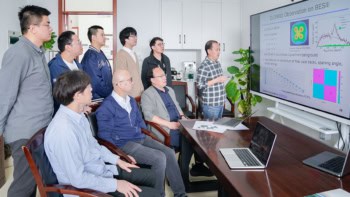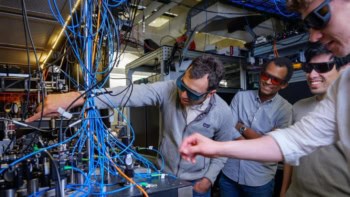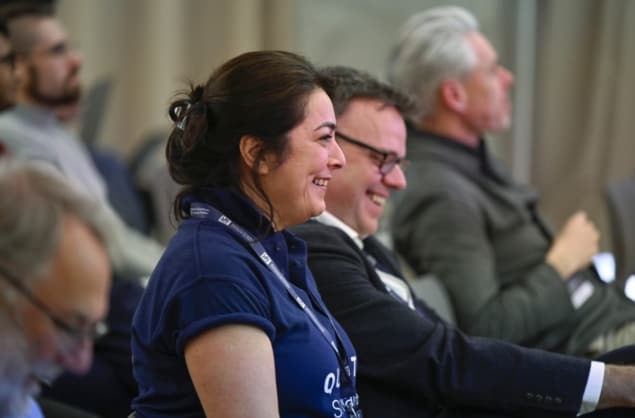
As leading figures in the UK’s quantum community gathered in Edinburgh to mark the launch of the first research centre in the country to be devoted to quantum software, there was a palpable sense that the development of quantum computing in the UK is entering a new and expansive phase. Held in April, the Edinburgh event came just a month after the release of the UK’s National Quantum Strategy, which commits £2.5bn of new funds to the development of quantum technologies over the 10 years from 2024.
That additional investment more than doubles the UK’s ongoing support for quantum research and innovation, with the current National Quantum Technologies Programme (NQTP) already delivering government funding of about £1bn since 2014. The new strategy also aims to capitalize on the rapid progress that has been made over the last 10 years – both in terms of technical achievements and the emergence of a vibrant and collaborative quantum ecosystem – by placing greater emphasis on translating breakthrough science into practical quantum computers that deliver real value for society and the economy.
“We have some important questions to answer,” said Sir Peter Knight of Imperial College London, a leading architect of the new strategic framework as well as the NQTP. “What is a quantum computer good for? How do we benchmark and validate performance? Where should we focus our efforts for fast and valuable outcomes?”
The Quantum Software Lab (QSL) aims to address some of those questions, with a key focus on investigating practical ways to exploit quantum computing for solving problems that are beyond the reach of classical machines. The lab, which is being hosted by the University of Edinburgh’s School of Informatics, has been established in a collaboration with the National Quantum Computing Centre (NQCC), and aims to accelerate the development and adoption of quantum computing by working with industry partners to translate their most vexing computational challenges into use cases that can be addressed through quantum computing.
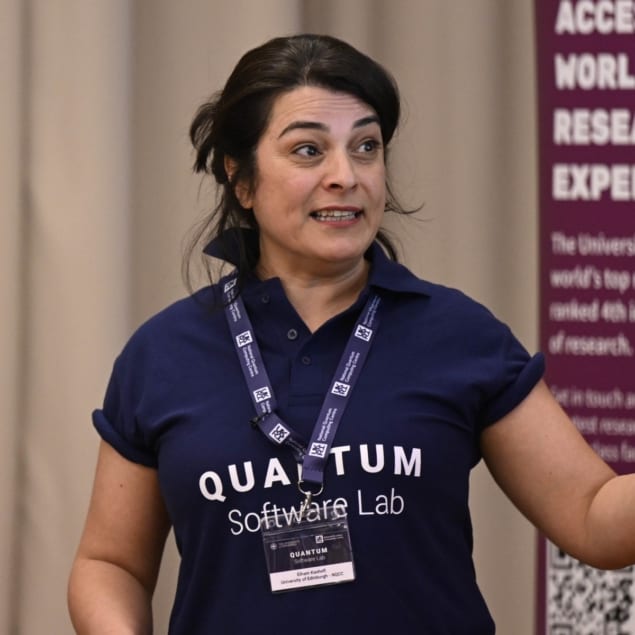
“We want to understand the pain points in different industries,” said Elham Kashefi, the director of the QSL. Kashefi is a professor of quantum computing at the University of Edinburgh and a CNRS director of research at the Sorbonne University in Paris, and was appointed chief scientist of the NQCC in November 2022. “That will allow us to develop use cases and applications for quantum computing that solve real problems.”
Those ambitions align with the NQCC’s user engagement programme, called SparQ, that aims to explore practical uses of quantum computing by providing access to the technology, alongside training and networking opportunities. The QSL team will work closely with the NQCC’s innovation specialists and applications engineers to identify and develop use cases where quantum computing can deliver a demonstrable benefit over classical solutions. “This joint endeavour will create a core research capability to address some of the key challenges in developing quantum software, paving the way towards practical applications of quantum computing that can have a real impact on the industry,” commented Michael Cuthbert, director of the NQCC. “The expertise within QSL will help to drive user adoption and provide a pathway to demonstrating quantum advantage.”
By creating a focal point for quantum software development in the UK, the QSL aims to attract new research talent, provide education and training for the next generation of quantum developers, and provide a source of scientific expertise for the wider quantum community. In some ways it fills a gap in the UK quantum landscape, with the early years of the NQTP focusing largely on demonstrating novel qubit architectures and developing quantum algorithms for performing specific computational tasks. Now that the emphasis has shifted to building practical quantum computers, there is a greater need for software to control the core quantum processors, characterize and mitigate for the errors caused by noise, and provide the critical connections between the quantum hardware and classical computing infrastructure.
“Quantum software is the glue that brings together all the different elements of a quantum computer,” commented Matthias Christandl of the University of Copenhagen, a prime mover in the new European Quantum Software Institute, speaking at the launch event. “It requires the ingenuity of quantum software scientists to harness the remarkable power of quantum hardware, while co-development of hardware and software will also be crucial as different qubit architectures continue to evolve.”
While the QSL will work in collaboration with the NQCC to explore specific use cases across different industry sectors, it will also develop generalized theoretical and mathematical approaches that can be applied across different hardware platforms and applications. Research at the lab will provide the foundational knowledge for follow-up phases of the NQCC programme in quantum software and applications, and will also pave the way for the UK’s first secure and verifiable distributed cloud platform for quantum computing. “We need to keep an open mind and allow blue sky research,” said Kashefi. “Advances in the science may enable new applications, while new applications may inspire new research directions.”
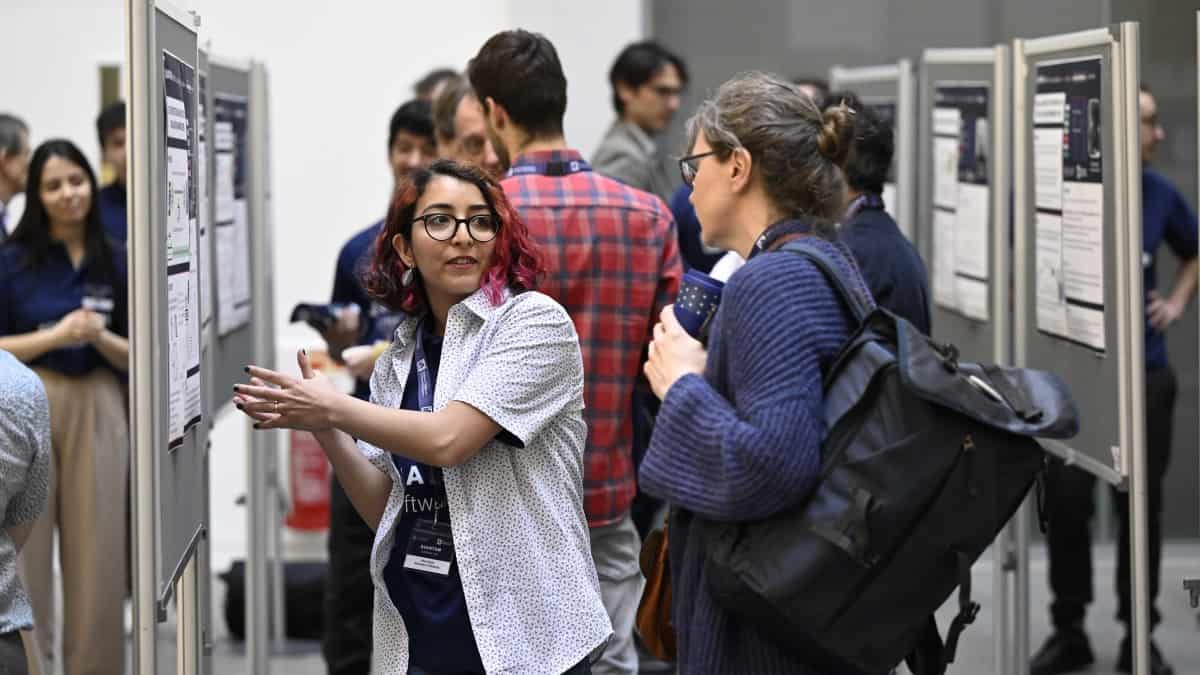
One key goal for the lab’s research programme is to develop the tools needed to prove whether a quantum-enabled solution achieves a genuine performance advantage over a traditional supercomputer. “We need formal methods to test whether an approach addresses the problem and delivers quantum advantage,” said Kashefi. “We want to explore the universe of possible applications, and find out where quantum advantage can be achieved and where it cannot.”
Kashefi believes that the outcomes from the QSL’s discovery science will help to guide the development of novel software solutions that can be used to solve real-world problems. “We want to be the engine that brings everything together,” she said. Within the lab’s overall framework there is a clear focus on translating specific use cases into practical solutions, with senior researchers in the team responsible for establishing initial use cases, translating the requirements into a research problem, developing and optimizing appropriate quantum algorithms, and then benchmarking the solution to make sure it meets requirements of the application. “Our aim is to create a start-up culture within an academic environment,” added Kashefi.
Located in the University of Edinburgh’s School of Informatics – by some margin the largest of its kind in the UK – the QSL will have access to valuable expertise in all areas of computer science. Around 30 researchers are already involved with the lab, while the team also has a direct link with EPCC, the university’s centre of excellence in supercomputing and data science. “To get the best out of current quantum computers they need to operate within a classical computing environment,” said Kashefi. “We need expertise in high-performance computing to help optimize system architectures and control systems, and to create distributed platforms that combine quantum hardware with classical computing resources.”
The QSL team is also in a perfect position to engage with scientists and engineers at the university who are working on research problems that can be addressed with quantum computing, such as molecular simulations in chemistry or many-body problems in physics. More generally, the aim is to create an open environment that fosters collaboration with both academic groups and industry partners. “We want our research to have the widest possible impact,” said Craig Skeldon, the QSL’s business development manager. “Our aim is to connect with end users in different industries to develop practical solutions, and to work with hardware and software providers who are developing innovative products.”
The lab’s strategic partnership with the NQCC will also help to create a community of quantum software specialists who can work with other stakeholders, including hardware developers and end users across government, academia and industry, to drive the development and adoption of practical quantum computers. “It takes a whole ecosystem to develop a useful quantum computer,” concluded Kashefi at the end of the launch event. “The NQCC is the dream partner for the QSL, and we are ready for the challenge.”


